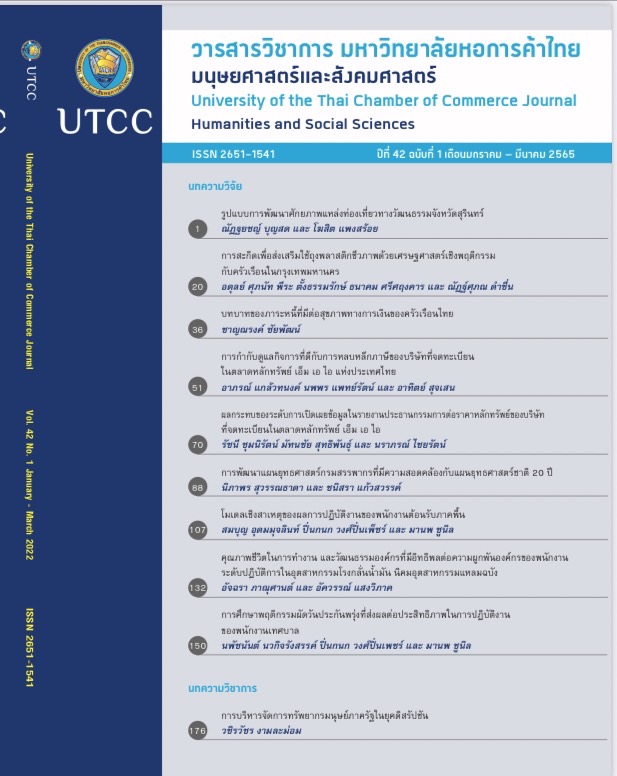The Study of Procrastination Behavior Effected Performance at Workplace of Municipality Staff
Main Article Content
Abstract
This research aimed to study the procrastination behavior at work in municipality office as the components of procrastination behavior created by Chu and Choi (2005). A mixed methods research was used. A qualitative research was used with a semi-structure and an in-depth interviewed 12 key persons in municipality office. A quantitative research method was used with a stratified random sample of 212 municipality staff from municipality office in Nakhon Pathom province, Nonthaburi province and Rangsit City. The questionnaire asking about the procrastination behavior with reliability of .904 was used to collect the data. Confirmatory factor analysis used. The results of this research found that: the components of the procrastination behavior at work of municipality staff consisted of two factors; passive procrastination behavior and active procrastination behavior. The model of the procrastination behavior at work of municipality staff was found to accord with empirical data. Chi-square goodness of fit test value was 52.824 with 42 degrees of freedom, p=.122, CFI=.996, Tuker-Lewis Index (TLI) = .993, SRMR = .033 and RMSEA=.028. These factors can be used as a guide for creating and setting all activities to activate the procrastination behavior in the way that lead to best manner of municipality staff in the workplace in the future.
Article Details

This work is licensed under a Creative Commons Attribution-NonCommercial-NoDerivatives 4.0 International License.
ลิขสิทธิ์ของบทความ
ผลงานที่ได้รับการตีพิมพ์ถือเป็นลิขสิทธิ์ของมหาวิทยาลัยหอการค้าไทย ห้ามมิให้นำเนื้อหา ทัศนะ หรือข้อคิดเห็นใด ๆ ของผลงานไปทำซ้ำ ดัดแปลง หรือเผยแพร่ ไม่ว่าทั้งหมดหรือบางส่วนโดยไม่ได้รับอนุญาตเป็นลายลักษณ์อักษรจากมหาวิทยาลัยหอการค้าไทยก่อน
References
ชูวงศ์ ฉายะบุตร. (2539). การปกครองท้องถิ่นไทย. กรุงเทพฯ: กรมการปกครอง.
พรรณวดี สมกิตติกานนท์. (2560). มุมมองเชิงบวกของการผัดวันประกันพรุ่งกับสุขภาวะ. วารสารพยาบาลทหารบก, 18(2), 16-23.
มุทิตา วรกัลยากุล. (2556). ความสำเร็จในการบริหารงานของเทศบาลนครรังสิต จังหวัดปทุมธานี. วารสารวิทยบริการ, 24(1), 144-158.
ลัดดาวัลย์ เพชรโรจน์, สุภมาส อังศุโชติ, และอัจฉรา ชำนิประศาสน์. (2550). สถิติสำหรับการวิจัยและเทคนิคการใช้ SPSS (ฉบับปรับปรุง). กรุงเทพฯ: มิชชั่น มิเดีย.
Batool, S. S, Khursheed, S., & Jahangir, H. (2017). Academic procrastination as a product of low self-esteem: A mediational role of academic self-efficacy. Pakistan Journal of Psychological Research, 32(1), 195-211.
Bond, M. J., & Feather, N. T. (1988). Some correlates of structure and purpose in the use of time. Journal of Personality and Social Psychology, 55(2), 321-329.
Chen, B.-B., & Kruger, D. (2017). Future orientation as a mediator between perceived environmental cues in likelihood of future success and procrastination. Personality and Individual Differences, 108, 128-132.
Choi, J., & Moran, S. V. (2009). Why not procrastinate? Development and validation of a new active procrastination scale. Journal of Social Psychology, 149(2), 195-211.
Chu, A. H. C., & Choi, J. N. (2005). Rethinking procrastination: Positive effects of “active” procrastination behavior on attitudes and performance. Journal of Social Psychology, 145(3), 245-264.
Cömert, M., & Dönmez, B. (2019). A qualitative study on the perceptions of administrators and teachers on procrastination behavior and workload of school administrators. Journal of Education and Training Studies, 7(2), 129-136.
Duru, E., & Balkis, M. (2017). Procrastination, self-esteem, academic performance, and well-being: A moderated mediation model. International Journal of Educational Psychology, 6(2), 97-119.
Ellis, A., & Knaus, W. J. (1977). Overcoming procrastination. New York, NY: Signet.
Emerson, R. W. (2013). The happiness experiment. London, England: Simple Web.
Fernie, B. A., Bharucha, Z., Nikcevic, A. V., & Spada, M. M. (2016). The unintentional procrastination scale. Journal of Rational-Emotive & Cognitive-Behavior Therapy, 35(2), 136-149. doi:10.1007/s10942-016-0247-x
Hair, J. F., Black, W. C., Babin, B. J., & Anderson, R. E. (2010). Multivariate data analysis (7th ed.). Cranbury, NJ: Pearson Education.
Harriott, J., & Ferrari, J. (1996). Prevalence of procrastination among samples of adults. Psychological Reports, 78(2), 611-616. doi:10.2466/pr0.1996.78.2.611
Hensley, L. (2013). The fine points of working under pressure: Active and passive procrastination among college students (Unpublished doctoral dissertation). The Ohio State University.
Klassen, R. M., Krawchuk, L. L., Lynch, S. L., & Rajani, S. (2008). Procrastination and motivation of undergraduates with learning disabilities: A mixed methods inquiry. Learning Disabilities Research & Practice, 23(3), 137-147.
Kline, R. B. (2005). Principles and practice of structural equation modeling (2nd ed.). New York, NY: The Guilford Press.
Knaus, W. J. (2000). Procrastination, blame, and change. Journal of Social Behavior and Personality, 15(5), 153-166.
Metin, U. B., Taris, T. W., & Peeters, M. C. W. (2016). Measuring procrastination at work and its associated workplace aspects. Personality and Individual Differences, 101, 254-263. doi:10.1016/j.paid.2016.06.006
Nabelkova, E., & Ratkovska, J. (2015). Academic procrastination and factors contributing to its overcoming. The New Educational Review, 39(1), 107-118.
Ng, B. (2018). Exploring procrastination and self-regulated learning through motivational beliefs. Journal of Research Initiatives, 3(3), 1-16.
Pahlavani, M., Nezhad, F. N., & Nezhad, N. N. (2015). Relationship between self-esteem with procrastination and self-efficacy among employers of professional and technical organization of Zahedan. Indian Journal of Fundamental and Applied Life Sciences, 5(S1), 4882-4891.
Perry, J. (2012). The art of procrastination: A guide to effective dawdling, lollygagging, and postponing, or getting things done by putting them off. New York, NY: Workman.
Pintrich, P. R., & De Groot, E. V. (1990). Motivational and self-regulated learning components of classroom academic performance. Journal of Educational Psychology, 82(1), 33-40.
Rabin, L.A., Fogel, J., & Nutter-Upham, K. E. (2011). Academic procrastination in college students: The role of self-reported executive function. Journal of Clinical and Experimental Neuropsychology, 33(3), 344-357. doi:10.1080/13803395.2010.518597
Rosenberg, M. (1965). Society and the adolescent self-image. Princeton, NJ: Princeton University Press.
Saplavska, J., & Jerkunkova, A. (2018). Academic procrastination and anxiety among students. In Proceedings 17th International Scientific Conference Engineering for Rural Development, 23-25 May 2018, Jelgava, Latvia (pp. 1192-1197). Jelgava, Latvia: Latvia University of Life Sciences and Technologies.
Solomon, L. J., & Rothblum, E. D. (1984). Academic procrastination: Frequency and cognitive-behavioral correlates. Journal of Counseling Psychology, 31(4), 503-509.
Steel, P. (2007). The nature of procrastination: A meta-analytic and theoretical review of quintessential self-reguratory failure. Psychological Bulletin, 133(1), 65-94.
Tice, D., & Baumeister, R. F. (1997). Longitudinal study of procrastination, performance, stress, and health: The cost and benefits of dawdling. Psychological Science, 8(6), 454-458.
Wells, A., & Matthews, G. (2015). Attention and emotion: A clinical perspective (Classic ed.). East Sussex, England: Psychology Press.


